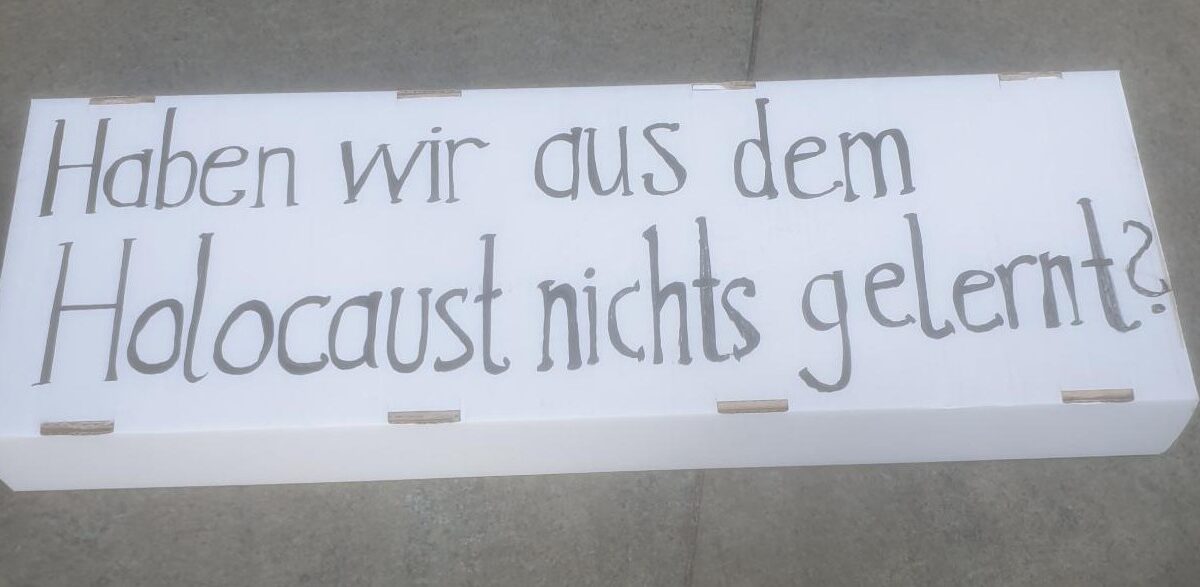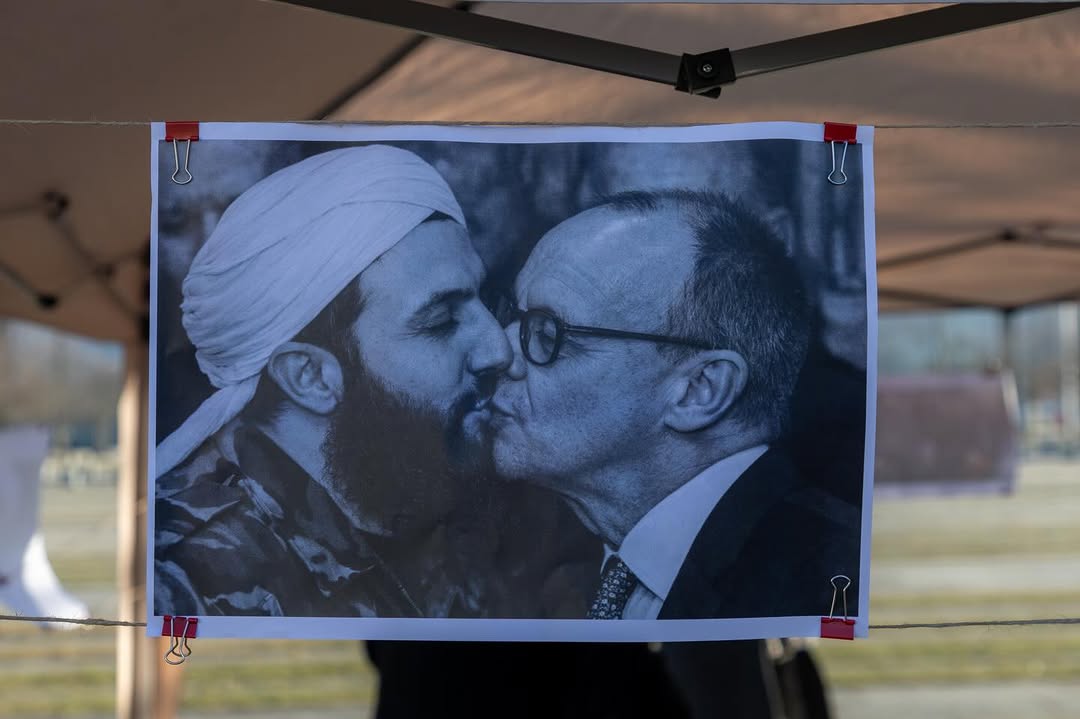Editor’s note: This is an interview with someone who was recently fined €1,500 by a Berlin court for holding up a sign. She prefers to remain anonymous. Most of the interview was taken in the middle of April, 2025.
Thanks for talking to us. Could you first tell us a little about who you are?
I’m 31 years old. I came here to Berlin one and a half years ago. I was living in Bielefeld before. I really like this city because of its international people. Then, there are so many possibilities in Berlin. I also came here to do more acting.
I arrived around the same time as the start of the war in Palestine. I felt there were so many people who were engaged in this topic. What was different to Bielefeld was that people were so naturally politically active. I really appreciated that people were shaping politics in the sense of our democratic values.
As the war in Gaza went on and so many people died I felt as if I also have to engage in any kind of action, since the war got absurd. And disproportionate. I felt very helpless. I wanted to ask the government: “Why don’t you see what is happening?” We have a history in Germany, and we should have learned from this history. We also are responsible when war crimes are committed and we keep being silent. We should apply our knowledge of our history.
You wanted to do something. What sort of activities did you get involved in?
I thought, okay, maybe I could just go on the street on my own and remind people what our teachers in school always taught us about the Holocaust. They said that genocide should not happen again, nor should anything which has the character of genocide.
So, I took two signs and went to the government building. On one sign I wrote: “Haben wir aus dem Holocaust nicht gelernt?” [Haven’t we learned from the Holocaust?], and on the other: “Nein, zu der Ermordung von derzeit 8.500 Zivilisten in Gaza” [No to the murder of 8,500 civilians in Gaza so far].
How did the police react to your action?
There were three policemen who were actually there for a demonstration by Neue Generation in the government quarter. They stopped me and read my papers. They contacted their Zentrale [headquarters] I think it was the Landeskriminalamt [State Criminal Police] but I am not sure, who said they have to investigate this. That’s when they told me: “You can’t continue with this.”
They then took my papers, they wrote something saying I might get an Anzeige [notification of a court hearing], and then they sent me home.
When was this?
It was the 3rd November 2023.
You did receive an Anzeige. When did that arrive?
Well, first I got a letter. It was just information. Following this, it took a lot of time—half a year or something. Then I got a yellow letter, which is a serious one.
What did it say?
It said that I was being accused of Volksverhetzung [hate speech].
And now you’re going to be in court. What’s your feeling about this?
I’m absolutely confused. It felt like I was doing something wrong, but I didn’t. I had not intended to do anything wrong. My teachers taught me in school that democracy also means to question, to say your opinion, to look from different perspectives, and to have the right to do so.
I had the a feeling that Germany has a progressive understanding/ imagination about Menschenrechte and Völkerrechte [human rights and international law] because of its history.
And now, when I talk about our historical responsibility and humanitarian crimes in Gaza in one sentence, Germany starts to discuss the probability of playing down the Holocaust, instead of taking it seriously.
I would draw a comparison between the Holocaust and Gaza, but this is to point out that nothing similar to the Holocaust should ever happen again. The Holocaust is a benchmark we use to prevent a greater evil. What I mean is that in everything we do, we do make comparisons. How else can we know what goes too far?
And to repeat: all that you did was hold up one sign asking whether Germany has learned from the Holocaust and another sign opposing the violation of human rights in Gaza. It wasn’t antisemitic, it wasn’t racist, but now you’re facing trial because of this?
Yes.
How are you preparing for the trial? What sort of support have you received so far?
I spoke to a lot of people—to lawyers and organizations who have experience with this topic. They told me that it’s not a single case when it comes to a critic of Israel. There are many people who have experienced the same fate .
I don’t really feel alone with it, but on the other hand, I can’t know how it will go because I feel that these cases are not normal cases. They are not judged in the same way.
Have you had the chance to talk to other people facing similar criminal charges to yours?
No, actually not. It seems difficult because nobody stands on the street and says: “Yes, I had the same experience”.
It’s easier to get in touch with lawyers or organizations working in this field, especially those who have already worked on similar cases.
Has there been any media coverage of your case?
Not yet. There is one person who is writing about it, but she is the only one.
When is the court case going to be?
24th April of 2025
How can you ensure that you’re not left on your own?
I think it’s important to have a good lawyer who can give advice for a good defence. On top of this, there are so many groups who have taken on the mission of accompanying such cases. They provide both mental and physical support.
Before the trial started, they said that I could pay a fine of €200 and we wouldn’t go to court. I said: “No, I’m not paying. I’d rather go to court”, because I didn’t do anything wrong. What makes me feel safe is when we stand together and say: “No. They have no right to do this to us.”
What’s the worst that could happen if you lose the case?
If I lose the case, I could have to pay a lot of money, but that is not the worst that could happen. The worst is when the court decides that we are not allowed to say our opinions anymore.
So it’s not just about you?
No. I think it will continue like this if we don’t stay here and say: “Not with us!”
Is Germany different? There are similar things happening in the US and Britain, but maybe the public response is different?
I actually don’t know. What I know about Germany is that we are not allowed to criticize Israel, and if you do, you’re an antisemite. You can chose either you criticize the politics of Israel and you’re an antisemite, or you rather shut your mouth.
My teachings of the Holocaust is not to unconditionally support the country or the people who we committed genocide against. Instead, we should learn from this history that genocide should never, ever happen to anybody.
Do you think things can get better in Germany?
(long pause)
I think people have shown us before that when the whole population is against something, it can be changed. We can make a difference.
How do we make more people want change?
That’s the point. I think people will only get angry about something when it’s about themselves. And I think that people don’t understand yet that my case also affects them.
So, what would you say to someone about why your case matters to them?
My freedom of opinion was taken away from me. Yes, Palestine is far away, and people ask, “What does the Middle East conflict has to do with me?” They say, “Palestine is not even a democracy. It is not their kind of system.”
But the point is, it is not about that. It is about us. When we are charged wrong because of criticizing the state, then democracy disappears. Step by step.
So, if your freedom of opinion is restricted, then this can lead to similar restrictions on other people?
Definitely. What worries me is that there are so many cases of repression that are not even hidden by the state. It is getting normal.
We have so many cases now. We have your case. We have the Berlin 4 —European and US citizens who are threatened with deportation. We have Palestinians who are being deported to Greece already. Some people are appalled by this but don’t know what they can do about it. What do you think we can do to stop democracy being undermined?
(longer pause)
I am not a political scientist. But I think it’s more important than ever that we as a younger generation go into politics and have influence, and maybe find strategic ways to put pressure on certain systems.
You have had a horrible experience, and you’re still going through this experience. It would be very easy for you to say: “I’m not getting into any more trouble. I’m going to shut up”. This doesn’t seem to be your reaction. Why?
If something that belongs to you is taken away from you, would you just accept it? We should have the freedom of thought and speech in Germany, and nobody has the right to silence me by misinterpreting my words.
What’s your next step? We have the court case, what happens then?
My next step for this is to accompany the court cases of people who have been unfairly charged, to show them that they are not alone. But I think everybody should do whatever he or she is good in to support in our current and future political situation.
We have to show them that we are not letting this go – even if we have to fight every single case.
Editor’s Note: We talked again after the court case to discuss what had happened and what happens next.
We did most of this interview before your court case. You were in court yesterday. How did it go?
I received a fine of €1,500. I didn’t know that one could be prosecuted for a question regularly covered in history class if it was related to Palestine. But now I know that although Article 5 Paragraph 1 GG offers freedom of speech according to established case law covering many cases, in the case of Palestine, a judge does not have to stick to this.
Are you going to pay the fine?
No, I will not pay anything for now.
What happens now? How can people support you?
We will challenge the verdict. Further we are going to organize a fundraiser soon and would be happy for support.
I would be very, very motivated if I saw that more people not just accept the judgement but to go further until we reach the Bundesverfassungsgericht [high court] This is what makes me stronger.
Thanks a lot. Free Palestine.




